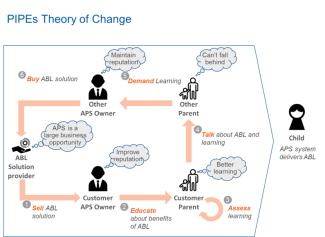
ECD Implementation Insights
Demand and Affordable Preschool in India
November 1, 2018
In India, there is a high demand for affordable private preschools (APSs). Unfortunately, despite the motivations of parents and their investments, students’ learning outcomes remain poor.
PIPE: A case study of systems approach for scaling quality early education solutions presents the nonprofit FSG’s approach to addressing the challenge of poor learning outcomes in urban India by leveraging existing desires and motivations of the various actors (including parents, APS owners, and solution providers) in the system. The paper also provides insights on how to design both an overall program and market‐based education solutions in order to achieve impact at scale. It draws primarily on research using PIPE and the learning and insight from the FSG team on the ground.
India has made remarkable progress toward universalizing primary education, but learning outcomes are poor
Only 35 percent of 9th and 10th graders can read at a Grade 4 level. A key reason for this is the rote memorization technique used in the early years. FSG’s research found that 78 percent of children entering Grade 1 in affordable private schools (APSs) could not read three simple three-letter words (e.g., “sat”, “pin” or “mug”).
Activity-based learning (ABL) in the early years can help improve learning outcomes
There is considerable consensus that ABL has powerful impact both in terms of helping children learn concepts, as well as providing a wider range of early development benefits including socio-emotional, physical, and cognitive. The quality of preschool education in APS is particularly important because low-income families, who constitute 70 percent of urban India, are overwhelmingly investing in APS, foregoing free government options.
In 2014, FSG launched the Program to Improve Private Early Education (PIPE) to replace rote memorization with ABL in ~300,000 APS in India
There are barriers on both the demand and supply sides to realizing the potential of ABL. On the demand side, parents, APS administrators and teachers are not demanding ABL and on the supply side, solution providers don’t see a business opportunity to sell in the APS market.
PIPE works to address these barriers by getting eight private companies (“partners”) to supply high-quality ABL solutions at scale and by getting parents to aspire and demand ABL. PIPE helps its partners recognize the business opportunity and address challenges in serving the APS market. Once partners are convinced of the economic opportunity in APS market, they will educate parents on benefits of their ABL solution and will expand their services to millions of children.

The past three years have provided valuable insights on how to design an overall program and market-based solutions to achieve impact at scale:
Leverage existing motivations
Early education should ideally help children develop a range of domains rather than having a narrow academic focus. However, our research found that parents’ main motivation behind pre-primary enrollment was academic–English and mathematics were a high priority, while other skills (e.g., team work) were less valued. Convincing parents of the benefits of these other skills might well have been beyond what PIPE could achieve. While PIPE uses solutions that can help children develop a range of skills, we emphasize improvements in English and mathematics because these are what parents already value. With this approach, parents easily recognize the benefits of ABL, without having to fundamentally shift their beliefs around what skills their children should be learning.
Be prepared to pivot
To be successful, programs must be able to respond to changing conditions learned by working in the system. This may require significant pivots in approach and activities.For example, PIPEs original approach focused on scaling chains of preschools (i.e. institutions that specialize in preschool and do not offer classes beyond kindergarten). However, data from our research revealed that 74 percent of 4-and 5-year-olds were attending preschool at “attached providers”—schools that offered classes to 10th grade, rather than chains of preschools.
PIPE therefore had to pivot to meet the realities of the market.
Invest in credibility
It is important to think about activities that can not only achieve immediate program objectives, but also contribute to the broader field and therefore help build credibility.For example, PIPE’s research with more than 4,400 parents allowed us to share valuable new data with the field, despite being a relatively new participant in the conversation. While PIPE’s short-term goals could have been met with more limited research, the extra investment laid the foundation for building several key relationships that continue to be a major source of strength for PIPE today.
FSG is a mission-driven nonprofit supporting leaders’ in creating large-scale, lasting social change. The Inclusive Markets team based in Mumbai works on market-based solutions that address development challenges central to the lives of low-income families. To learn more about the Program to Improve Private Early Education, visit www.fgs.org/pipe
Vikram Jain is a Director at FSG and he currently leads FSG’s Program to Improve Private Early education (PIPE). He has also led FSG’s low-income housing (LIH) program and co-led the livelihoods program.
Gauri Kirtane Vanikar is the technical expert on the PIPE team at FSG and has more than 10 years’ experience working in the nonprofit education sector. Prior to joining FSG Gauri worked with the Akanksha Foundation, a non-profit that works to improve the lives of children from low-income communities through education.
Sana Kazi is the Program Manager for FSG’s Program to Improve Private Early education (PIPE) program. Sana started her career at Goldman Sachs India as part of their asset management division.
About NIEER
The National Institute for Early Education Research (NIEER) at the Graduate School of Education, Rutgers University, New Brunswick, NJ, conducts and disseminates independent research and analysis to inform early childhood education policy.
